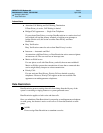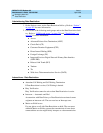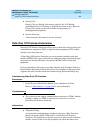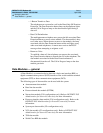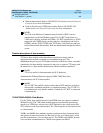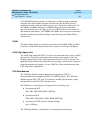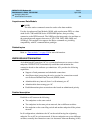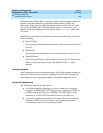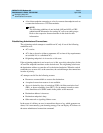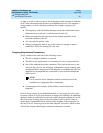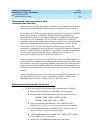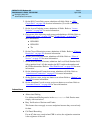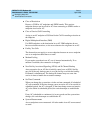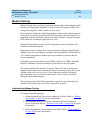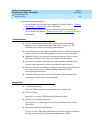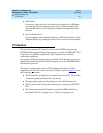
DEFINITY ECS Release 8.2
Administrator’s Guide
555-233-506
Issue 1
April 2000
Managing data calls
410Administered Connection
15
■ A local data endpoint connecting to a local or remote data endpoint such as
a connection between two 3270 data modules.
NOTE:
The following guidelines do not include AAR and ARS, or GRS
administration information for routing AC calls over trunk groups.
Refer to the respective feature elsewhere in this book for that
information.
Establishing Administered Connections
The originating switch attempts to establish an AC only if one of the following
conditions exist:
■ AC is active.
■ AC is due to be active (either a permanent AC or time-of-day requirements
are satisfied if it is a scheduled AC).
■ Originating endpoint is in in-service or idle state.
If the originating endpoint is not in service or is idle, no activity takes place for the
AC until the endpoint transitions to the desired state. The originating switch uses
the destination address to route the call to the desired endpoint. When the switch
establishes two or more ACs at the same time, the switch arranges the connections
in order of priority.
AC attempts can fail for the following reasons:
■ Resources are unavailable to route to the destination.
■ A required conversion resource is not available.
■ Access is denied by class of restriction (COR), facilities restriction level
(FRL), or bearer capability class (BCC). Or, an attempt is made to route
voice-band-data over SDDN trunks in the public switch network.
■ Destination address is incorrect.
■ Destination endpoint is busy.
■ Other network or signaling failures occur.
In the event of a failure, an error is entered into the error log, which generates an
alarm, if it is warranted by your alarming strategy. You can display AC failures via
the
status-administered connection command.



